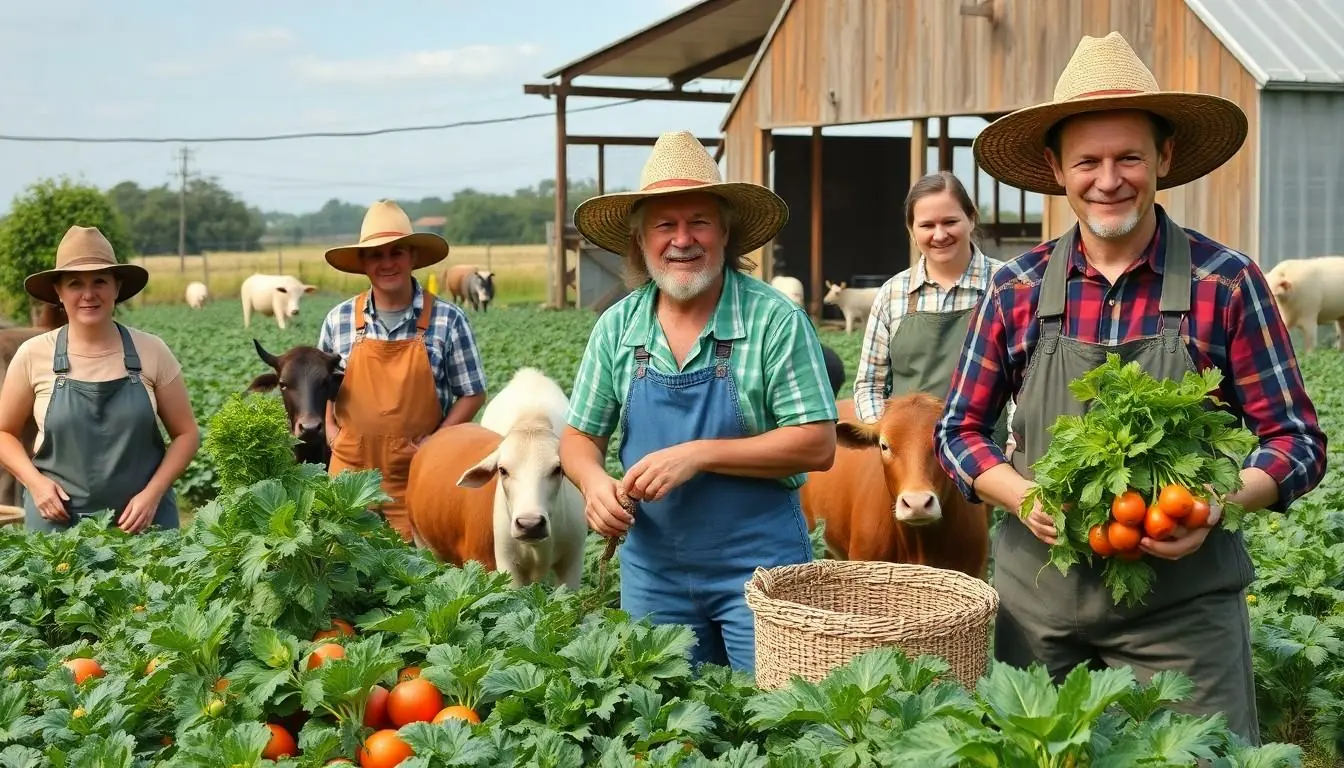In a world where the only thing growing faster than technology is the demand for sustainable practices, sustainable agriculture jobs are sprouting up like weeds in a well-tended garden. These positions not only promise a fulfilling career but also contribute to a healthier planet. Who wouldn’t want to trade a cubicle for a field of greens?
Table of Contents
ToggleOverview of Sustainable Agriculture Jobs
Sustainable agriculture jobs encompass a wide range of positions aimed at promoting environmentally friendly farming practices. These roles include sustainable farmers, agronomists, and environmental scientists, each contributing to a healthier planet. Many individuals seek these career paths due to their alignment with personal values related to sustainability and environmental stewardship.
Growing interest in organic farming creates numerous opportunities for those passionate about ecological methods. Positions may involve researching new technologies to improve crop yields while minimizing environmental impact. Individuals in these careers often focus on soil health, water conservation, and biodiversity, essential for sustainable farming.
Education and training vary across roles. Some positions require degrees in agriculture, environmental science, or related areas, while others may prioritize practical experience. Many programs now offer specialized courses on sustainability, increasing job readiness for aspiring candidates.
Employers in sustainable agriculture include non-profits, government agencies, and private companies, all invested in promoting sustainable practices. Job seekers may find opportunities in regional agricultural cooperatives or sustainability consultancy firms, allowing for varied work environments.
The growth of sustainable agriculture jobs reflects rising consumer demand for sustainable products. As awareness of climate change and food systems grows, these careers will likely expand, making now an opportune time for those considering entry into the field.
Types of Sustainable Agriculture Jobs

Sustainable agriculture jobs encompass a variety of roles aimed at promoting eco-friendly practices within the agricultural sector. These positions appeal to individuals seeking meaningful work that benefits the environment.
On-Farm Positions
On-farm positions include sustainable farmers and crop managers. These professionals focus on implementing organic farming methods that support soil health and reduce chemical use. Additionally, they employ techniques such as cover cropping and crop rotation to enhance biodiversity. Livestock managers also play an essential role by managing animal welfare alongside sustainable grazing practices. Opportunities for hands-on roles are abundant on various types of farms, including community-supported agriculture and permaculture sites.
Research and Development Roles
Research and development roles are crucial for advancing sustainable techniques. Agronomists conduct studies on soil health and crop performance under different environmental conditions. They analyze data to improve farming practices while minimizing environmental impact. Additionally, environmental scientists assess the effects of agriculture on ecosystems, guiding policy and practice. Research scientists often collaborate with universities and agricultural organizations to develop innovative solutions. These roles lead to significant advancements in sustainable practices that can benefit the entire sector.
Policy and Advocacy Jobs
Policy and advocacy jobs shape the framework for sustainable agriculture. Professionals in this field work for non-profits and government agencies, creating policies that support environmentally-friendly farming practices. They engage with farmers, creating programs that foster sustainable initiatives. Advocacy specialists raise awareness about sustainable agriculture, addressing consumer concerns and promoting eco-friendly products. Collaborating with local communities often enhances the effectiveness of these efforts, leading to broader adoption of sustainable methods.
Skills Required for Sustainable Agriculture Jobs
Sustainable agriculture jobs require a combination of technical and soft skills to effectively address modern farming challenges.
Technical Skills
Knowledge of agricultural technology is essential. Proficiency in data analysis enables individuals to interpret trends and enhance crop yields. Familiarity with sustainable farming techniques, such as crop rotation and integrated pest management, contributes to effective practices. Understanding soil science helps maintain soil health and fertility. Additionally, skills in environmental monitoring are crucial for assessing the impact of farming operations on ecosystems. Finally, expertise in irrigation systems ensures efficient water use and conservation.
Soft Skills
Collaboration is vital in sustainable agriculture. Communication skills foster teamwork among diverse groups, including farmers, scientists, and policymakers. Adaptability helps individuals navigate changes in regulations and consumer demands. Problem-solving skills are necessary for addressing challenges in sustainable practices. Strong organizational abilities support project management and planning tasks on farms. Passion for sustainability motivates individuals to advocate for eco-friendly methods and inspire others. These soft skills collectively enhance the effectiveness of professionals in the field.
The Importance of Sustainable Agriculture Jobs
Sustainable agriculture jobs play a vital role in addressing environmental challenges. The need for eco-friendly practices becomes increasingly urgent as climate change impacts global food systems. Many individuals find personal fulfillment in careers that positively influence the planet, making sustainable roles appealing.
Various positions contribute to sustainable agriculture, such as sustainable farmers and environmental scientists. These roles are essential for promoting practices that protect biodiversity and improve soil health. Over recent years, interest in organic farming has surged, creating job opportunities for individuals passionate about ecological methods.
Education requirements differ across these jobs. Some positions require degrees in agriculture or environmental science, while others prioritize hands-on experience. Organizations like non-profits and government agencies actively seek professionals equipped to implement sustainable practices.
The demand for sustainable products continues to rise, signaling a favorable climate for new careers in this field. Off-farm opportunities also exist, including research and development, which drives innovation in sustainable techniques. Agronomists and environmental scientists play crucial roles in analyzing data and collaborating with academic institutions.
Advocacy positions help shape the future of sustainable practices. Creating supportive policies and raising awareness about eco-friendly methods fosters broader adoption within communities. Skills necessary for success encompass both technical and soft abilities. Knowledge of sustainable farming techniques and environmental monitoring paired with strong communication and collaboration skills proves invaluable.
Professionals in this field adapt to modern farming challenges, enhancing their effectiveness. The combination of technical expertise and a passion for sustainability drives progress, highlighting the importance of these vital jobs in ensuring a sustainable future.
The landscape of sustainable agriculture jobs is evolving rapidly as society shifts towards eco-friendly practices. These careers not only offer personal satisfaction but also contribute significantly to environmental health. With the increasing demand for sustainable products, opportunities abound for those ready to make a difference in farming and related fields.
As individuals explore various roles from on-farm positions to research and advocacy, they’ll find that the combination of technical skills and a commitment to sustainability is crucial. This sector promises growth and innovation, making it an exciting time for anyone considering a career that aligns with their values and passion for the planet. Embracing these roles means playing a vital part in shaping a more sustainable future.



